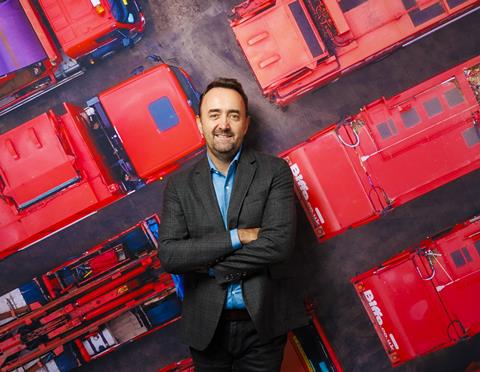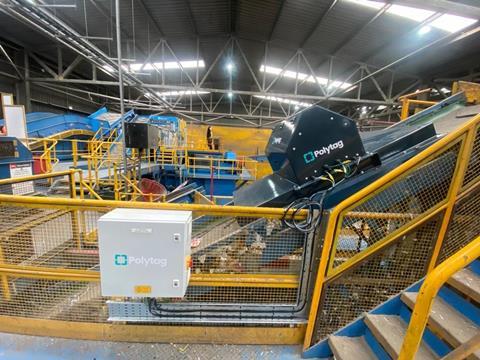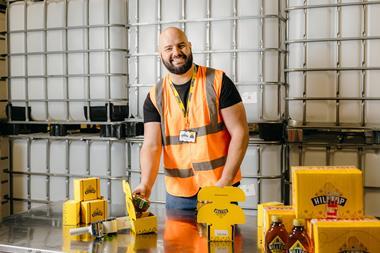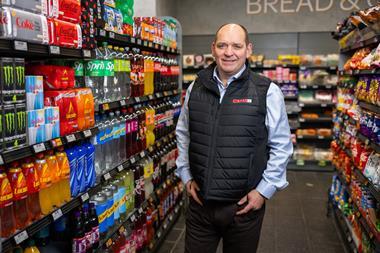Biffa lost millions when Scotland’s DRS collapsed, but its CEO Michael Topham believes ‘investment-grade’ policies can still make a massive impact
If anyone still thinks of Biffa as that local bin collection and landfill business, the huge price paid by investors when it went back into private hands in 2023 ought to lay that image to waste. The £2.1bn deal completed by US-based Energy Capital Partners proved it was the very definition of “investment grade”, even if a decade earlier it had courted disaster after going into bankruptcy.
Now, CEO Michael Topham, who took the reins in 2018 after being promoted from CFO, uses that phrase as the guiding mantra for a company with fingers in so many pies in the circulatory realm, it has data Defra would die for.
But Biffa and Topham also know what it’s like to get their fingers burnt, most famously after losing millions following the collapse of the Scottish government’s deposit return scheme (DRS) in 2023, which sees the company awaiting the outcome of a court claim for £166m in lost profits.
Yet that’s not stopped Biffa looking to expand its powerful empire as Defra, and the rest of the UK, embarks on the rollout of a raft of new circularity legislation, including a DRS mark 2, which has sparked a new clash among the devolved nations.
Topham’s talk with The Grocer follows the publication of Biffa’s new report ‘Reality Check’, an update on a document it first produced three years ago in a bid to get ministers and industry to bring some much-needed realism to their green ambitions.
The sector faces a deluge of legislation in the form of Extended Producer Responsibility (EPR), DRS and recycling rule changes, which Topham says are massive opportunities to drive investment and attract cast-iron investment – if ministers don’t mess things up again.
“Politicians sometimes talk as if there’s some kind of sunny uplands Nirvana, where there’s no waste at all and everything’s wonderful,” he says. “We want to create a dose of reality and say that’s all very well, but there are things we need to do now. Our initial reality check was three years ago, and it was a blueprint for waste net zero.
“We thought now is a good time to look at the progress that’s happened since, or sadly and more accurately, focus more on the fact that a lot of things haven’t happened as we would have wanted. We’re in a time when you have quite powerful voices in different sectors and political circles that will potentially blow policymakers off course if they’re not careful.”

Topham caveats his subsequent character assassination of Defra’s track record by saying it could have been even worse. “If you’d spoken to me 18 months ago, I would have been far more cross at the lack of progress. We had the Resources and Waste Strategy that was announced by Michael Gove in 2018, and for about six years progress was pretty non-existent.
“In fairness, in the past couple of years, probably the last year of the Conservatives and the first year under Labour, to their credit, they’ve got some really high-calibre people into Defra in particular and made some pragmatic decisions to get some of the policies out of the door.”
Treasury’s huge mistakes
This year brought the first wave of the government’s Simpler Recycling legislation – a bid to bring order to the postcode lottery of waste and recycling services across the UK. But Topham says the Treasury has made huge mistakes in the war on plastic in particular, which it desperately needs to put right if its new wave of regulations is to “stand the test of time”
“The standout thing that’s not worked in anywhere near the way we hoped is the plastic packaging tax, and more broadly, the policies designed to stimulate better management of plastic,” he says. “Biffa has definitely been on the receiving end of that. We made big investment in UK domestic recycling, and the policy instruments – both existing and new policies – have almost worked against us. All the packaging tax has done is drive up the cost of recycled plastic and drag in material from other countries to such a point it’s created a disincentive to recycle plastic. We were almost in a better position before the tax, frankly.”
Topham clarifies that it’s not the tax itself but the 30% recycled content inclusion that’s to blame.
“If you look back, one of the greatest policy successes in our sector was the landfill tax and the fact that an escalator was put on it. The fact the tax went up gave companies an incentive to invest in different treatments, everybody knew the cost of landfill was going up and up. It really worked.
“We could do the same with the plastic packaging tax. There’s a 30% inclusion level, but we know it’s very technically possible to have far higher levels – easily 50% or more, in some cases 100% - so why not put in a progressive inclusion level?
“It would need to be coupled with better controls of imported plastic. There’s a lot of plastic coming to the UK badged as recycled that a lot of people don’t believe is recycled. They think it’s virgin plastic that’s been mixed with recycled plastic. There’s no effective certification and it’s being self-declared. That can’t be what was intended.
“And the third thing that has to happen is getting a lot stricter on what’s exported. I don’t think it’s right that waste materials that have only gone through a cursory sort should be exported and benefit from recycling PRN certification and other subsidies. How many more shameful images do we need of poor-quality plastic ending up in foreign countries?”
Name: Michael Topham

Born: Yorkshire
Lives: Amersham, Bucks
Age: 52
Family: Married with three kids aged 21, 19, 16
Potted CV: Trainee accountant to manager (PwC London); VP finance (gf-x); finance director (Greenstar); divisional director roles, then CFO, now CEO (Biffa)
Business icon: Jamie Dimon, CEO of JPMorgan
Favourite quote: ‘Nobody cares how much you know until they know how much you care’ (Theodore Roosevelt)
Book currently reading: The Great Upheaval by Jay Winik
Hobbies: Golf
Favourite film: Trainspotting
Favourite album: OK Computer by Radiohead
Favourite book: Travels in the Land of Kubilai Khan by Marco Polo
Topham is much more supportive of the government’s controversial plans for EPR, despite huge industry anger over the costs and with the first invoices landing this month. “EPR is the backbone. It’s the basic ‘polluter pays’ policy, and I think people struggle to argue against it, despite their fears over the cost,” he claims.
But Topham says the EPR rollout will live or die by the “devil in the detail. Critically, if it accurately allocates the cost of recycling different materials, it should drive better behaviours by the people who design the packaging and products.”
With Biffa holding contracts with councils meaning it collects the equivalent of one in 10 UK households’ rubbish, Topham claims it can help Defra get those calculations right. Yet a succession of base fee estimates from Defra have each been met with horror across different sectors, along with calls for EPR to either be scrapped, delayed or sent back to the drawing board. Topham says Defra’s main mission is to ensure they can counter the industry’s argument that they’re writing a blank cheque to fund a bottomless local authority money pit.
“We’ve looked at Defra’s numbers; we’ve done a lot of work internally to benchmark it, and I don’t think they’re a million miles off actually,” he says. “People have to accept there are going to be bumps in the road, and I’m sure in the first wave there will be some winners and losers, but ultimately the supply chain has to get hold of this thing and make it more sophisticated.
More Big Interviews:
-
From sugar giant to health pioneer: Tate & Lyle’s reinvention
-
How Yeo Valley is diversifying from dairy and ‘democratising organic’
-
Nadiya Hussain: my BBC exit, Islamophobia and new grocery ranges
-
The Avengers of Indian food: how Gymkhana is spicing up grocery
“What I can assure companies is that the market for those local authority services outsourced to people like us is fiercely competitive, it’s very well procured, and its actually the lowest-margin part of the Biffa business. I can reassure people there isn’t a pot of gold for companies like us.
“What I have offered Defra is to share the data. Of course, we’d have to go through some legal loopholes, and we’d have to anonymise, but we can share it, put that whole issue to rest and reassure producers there’s no blank cheque.”
Topham believes there’s little chance of any serious rowback by Defra on EPR, despite the industry’s wave of protests. “A pretty senior official presented it in simple terms: “It might not be perfect, but it is happening,” is what he said, and I think that sums it up.
When it comes to DRS, Topham has more personal reasons to demand reassurances from Defra: “I think there’s a lot of evidence from across the world that as a policy DRS is not just about recycling PET bottles and aluminium cans, it’s also about creating a sense of ownership for consumers. I think once we get it in, it’ll be successful and just become a way of life.”
But things have to be done very differently to Scotland where, after Biffa was appointed the DRS’ delivery partner by Circularity Scotland, the scheme fell apart amid a lethal cocktail of industry discontent and animosity between the Tory and SNP governments.
Day in court
Biffa expects its day in Scotland’s Court of Session in the autumn, with a judgement likely next year. Although, with appeals possible, the case could drag on much longer.
“I can’t comment too much on the case, but Scotland’s DRS collapsed, effectively, because the Scottish government, it was revealed, didn’t have the necessary power to implement it,” says Topham. “That was a bitter blow for us, having spent an awful lot of money and worked collaboratively to get Scotland ready. It was a big financial loss, and we believe there’s a legal case for redress.”
However, far from being put off DRS for life, Biffa now wants a slice of the action from Defra and the devolved governments’ new plans for a UK rollout in October 2027.
“The DMO has been established, and there’s been some really credible people appointed to it,” Topham says. “That’s good, but the clock is ticking. We know from the timeline and the experience in Scotland that two years is not long. I very much hope Biffa can have a role. I don’t think there’s any baggage [from the court case], and I would really hope our reputation was only enhanced by the experience we had with producers, but clearly time will tell.”

Yet Topham says this time it will be far more careful about the guarantees it gets. “They can’t again ask a private company to put up so much capital with effectively no security guaranteed. We’re not going to go blindly back into the same risk again. With the appropriate caveats, it’s still an attractive proposition, but there’s a real cautionary tale here around policy generally.
“We have a phrase we’re constantly using at the moment, which is about needing ‘investment-grade policy’. Policy needs to be designed in such a way the right conditions are there to unlock capital. It’s not about guaranteeing profits. Policies need to stay the course and withstand political changes.”
Sadly, there’s precious little evidence of that in recent years, which is why, Topham argues, ministers must carefully read Biffa’s new report.
“At the moment, all we’ve go to show for the past few years is a plastic packaging tax that’s not supported domestic plastic recycling and instead seen business closures and failures, plus a DRS in Scotland that’s collapsed owing people lots of money, i.e. yours truly. If the government wants this sort of capital unlocked, they need to put in place the right protection, otherwise Biffa will struggle and others will struggle to be able to bid and put their money at risk.”
With the Welsh government becoming the latest to be threatened with action from Westminster for its breakaway plans on DRS, including glass, the omens are not necessarily strong, but as Topham’s reality check points out, the highly charged world of waste will never be a nirvana.




















No comments yet